|
|
|
Sort Order |
|
|
|
Items / Page
|
|
|
|
|
|
|
| Srl | Item |
| 1 |
ID:
150993
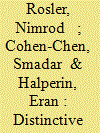

|
|
|
|
|
| Summary/Abstract |
The goal of the current research was to examine how discrete positive intergroup emotional phenomena affect conflict-related attitudes in different contexts of intractable conflict. We hypothesized that empathy, but not hope would be negatively associated with aggressive attitudes during escalation, while hope, but not empathy would be associated with conciliatory attitudes during de-escalation. In study 1, we examined our hypotheses within a correlational design in an emotion-inducing context, while in study 2 a two-wave survey was conducted during real-life events within the context of the Israeli–Palestinian conflict; a peace summit as well as a war. Both studies supported our hypotheses, thus indicating the unique, yet complimentary, contribution of each of the two emotional phenomena to the advancement of peace.
|
|
|
|
|
|
|
|
|
|
|
|
|
|
|
|
| 2 |
ID:
173136
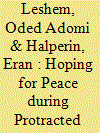

|
|
|
|
|
| Summary/Abstract |
Hope is an essential component in the pursuit of political change. In order to hope, citizens need to wish for the change and have some expectations that it could materialize. This article explores how the two components of hope (i.e., wishes and expectations) are constructed in the seemingly hopeless case of a protracted and violent conflict. Utilizing a large-scale survey administered in Israel, the West Bank, and the Gaza Strip, we show that citizens’ appraisals of their adversary’s wishes and expectations for peace affect their own wishes and expectations, which, in turn, influences their willingness to support peacebuilding efforts. Regrettably, citizens’ tendency to underestimate their rival’s wish for peace lessens their own hopes, which further abates the support for peacebuilding. The study is the first to illustrate a mechanism by which hope for peace is constructed and the pathways by which hope facilitates resolution. Theoretical and applied implications are discussed.
|
|
|
|
|
|
|
|
|
|
|
|
|
|
|
|
| 3 |
ID:
113884
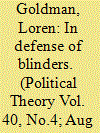

|
|
|
|
|
| Publication |
2012.
|
| Summary/Abstract |
Kant's progressive philosophy of history is an integral aspect of his critical system, yet it is often ignored or even treated as an embarrassment by contemporary scholars. In this article, I defend Kant and argue for the continuing relevance of his regulative assumption of historical progress. I suggest, furthermore, that the first-person stance of practical belief exemplified in Kant's conception of hope offers new resources for thinking about the relationship between the ideal and the real in political theory.
|
|
|
|
|
|
|
|
|
|
|
|
|
|
|
|
| 4 |
ID:
178799
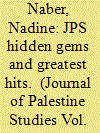

|
|
|
|
|
| Summary/Abstract |
This final essay in the “greatest hits” and “hidden gems” series tackles the topic of activism. Noting the richness and diversity of JPS’s contributions in this regard, Nadine Naber hones in on the necessity for hope and for grassroots mobilization at this Palestinian juncture. She exhorts readers to revisit Jonathan Kuttab’s 1988 essay, “The Children’s Revolt,” and Salim Tamari’s article, “The Palestinian Movement in Transition: Historical Reversals and the Uprising,” which appeared in 1991, for both inspiration and edification. Doing so, she argues, “allows readers to reimagine hope as a political ideology and as a set of practices that foster the possibilities for change and decolonization for years to come.”
|
|
|
|
|
|
|
|
|
|
|
|
|
|
|
|
| 5 |
ID:
143663
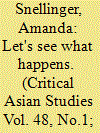

|
|
|
|
|
| Summary/Abstract |
This article analyzes Nepali student activists’ resistance and resilience as strategies that foreground their aspirations within existing political constructs. While they may enter into party politics through student organizations, they downplay their roles as political party foot soldiers. By focusing on their creative strategies and coping mechanisms during the political movement that ousted the monarchy in 2006, I highlight the nature of hope in youth political action through a common phrase they use: “Let's see what happens.” Using the concept of “subjunctive instrumentality” and ethnographic engagement, I analyze students’ internal micro-politics alongside public protests to demonstrate how they interweave the categories of idealism and opportunism, simultaneously inhabiting both in a way that makes politics personal and the personal political. These student activists’ “not-yet” orientation, in which they mobilize political, temporal, and symbolic contingencies, provides alternative templates for the present and visions for the future.
|
|
|
|
|
|
|
|
|
|
|
|
|
|
|
|
| 6 |
ID:
146417
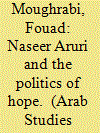

|
|
|
|
|
| Summary/Abstract |
A comparative approach is necessary when examining the role of Palestinian scholars and activists in defense of their cause. A look at the role of Native American scholars and activists reveals some similarities. Both groups worked hard to prevent the erasure of their identity by the settler colonial invaders. Another common theme is the emphasis on a politics of hope. Professor Aruri was a man of the left which has been in retreat throughout the Arab World. A renewed critique is necessary before the left can be resurrected. This offers the only democratic hope for the region.
|
|
|
|
|
|
|
|
|
|
|
|
|
|
|
|
| 7 |
ID:
189420
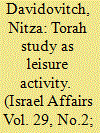

|
|
|
|
|
| Summary/Abstract |
This article discusses the contribution of Torah study as leisure activity to social support, hope and quality of life among Israeli adults. It shows that such study is associated positively with learners’ quality of life due to the acquisition of psychological resources that include social support by peers and hope. Shedding light on the world of people who study Torah as a leisure activity, the article also reveals that cultural sources that are part of an ancient tradition seem to contribute to one’s quality of life in the modern world as well.
|
|
|
|
|
|
|
|
|
|
|
|
|
|
|
|
| 8 |
ID:
144672
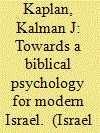

|
|
|
|
|
| Summary/Abstract |
This article examines the dependence of modern psychology and psychiatry on Greek thought, and specifically call for a Biblical reformulation of mental health with regard to 10 areas: (1) God, nature and creation; (2) men and women; (3) obedience versus disobedience; (4) fathers and sons; (5) mothers and daughters; (6) sibling rivalry and its resolution; (7) self and other: cycle versus development; (8) body and soul; (9) freedom, life and suicide; and finally (10) a hopeful versus a tragic outlook on life.
|
|
|
|
|
|
|
|
|
|
|
|
|
|
|
|
| 9 |
ID:
151144
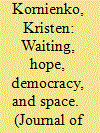

|
|
|
|
|
| Summary/Abstract |
This paper draws from two case study informal settlements and their recent Constitutional Court litigation to explore the connection between informal living spaces, democracy, and housing. The temporal element of this development dynamic is examined through the erosion and building of hope resulting from the political actions of the state and the political agency of the poor. This engagement of time as an element of space is considered through residents’ expectations manifested in social processes reflecting either the criticality of hope as a catalyst for bottom-up developmental agency or waiting as a fortification of the top-down status quo.
|
|
|
|
|
|
|
|
|
|
|
|
|
|
|
|
| 10 |
ID:
151148
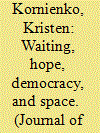

|
|
|
|
|
| Summary/Abstract |
This paper draws from two case study informal settlements and their recent Constitutional Court litigation to explore the connection between informal living spaces, democracy, and housing. The temporal element of this development dynamic is examined through the erosion and building of hope resulting from the political actions of the state and the political agency of the poor. This engagement of time as an element of space is considered through residents’ expectations manifested in social processes reflecting either the criticality of hope as a catalyst for bottom-up developmental agency or waiting as a fortification of the top-down status quo.
|
|
|
|
|
|
|
|
|
|
|
|
|
|
|
|
|
|
|
|
|